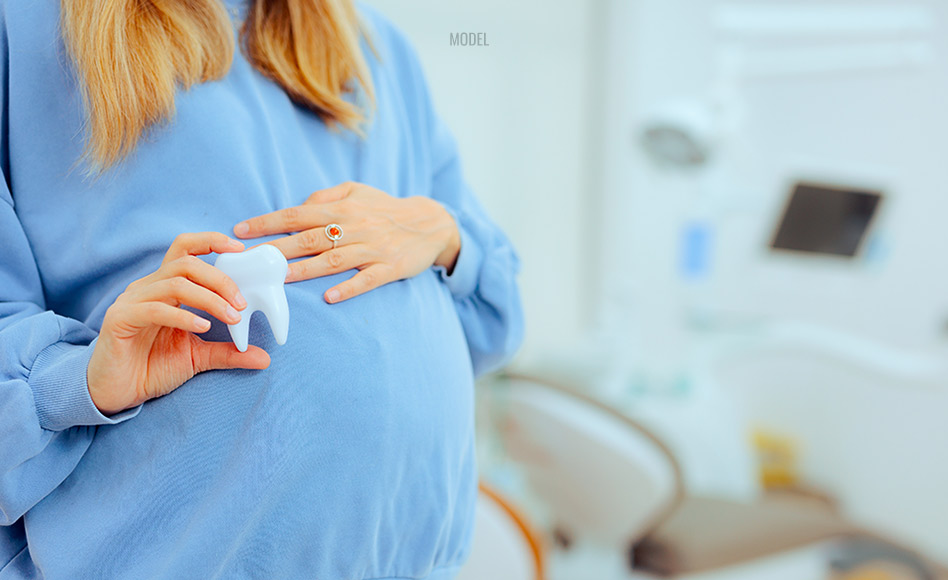
Essentials of Caring For Your Teeth During Pregnancy

Pregnancy brings about several changes to your body, but did you know it can also affect your teeth? This blog discusses some of the ways that pregnancy can influence your dental health and how to avoid problems with your teeth while you’re pregnant.
4 Min Read:
Pregnancy brings about several changes to your body, but did you know it can also affect your teeth? Even though you might be a bit overwhelmed with preparing for a new addition to your family, it’s not an excuse to let your dental hygiene slide. Below, we discuss how pregnancy can influence your dental health and how to avoid teeth problems while pregnant.
Increased Acidity May Mean Increased Cavities
Along with all of the other hormone changes that accompany pregnancy, increased mouth acidity can put you at a higher risk for cavities. Changes in mouth acidity can also be caused by a change in eating habits due to pregnancy cravings. Eating more carbs and sugars provides the bacteria responsible for tooth decay with extra fuel. Additionally, if you suffer from morning sickness, increased acid levels due to vomiting can damage your tooth enamel.
To avoid tooth problems associated with increased acidity in your mouth, you should brush or at least rinse your mouth with water after eating sugary or high-carb snacks and after vomiting. This helps to wash away food particles and excess acid so they are less likely to damage your teeth.
Loose Ligaments Can Affect Your Teeth
During pregnancy, a reproductive hormone called relaxin is responsible for loosening and relaxing your muscles, ligaments, and joints. Relaxin serves several purposes, one of which is to allow your body to adjust to carrying a growing baby. It affects all of the ligaments in your body, which can lead to heartburn and acid reflux (see above for the effects of acid on your teeth) and loosening of the ligaments in your mouth that help hold your teeth in place.
If you notice your teeth wiggling a bit when you’re pregnant, don’t panic. An increase in relaxin doesn’t increase your risk for tooth loss. However, if your teeth feel loose, it’s a good idea to get them checked out by your dentist to confirm that nothing more serious is happening.
Increased Inflammation May Mean Swollen Gums
Pregnancy increases your body’s inflammatory response, which can, in turn, increase your risk for gum-related issues. Higher hormone levels when you’re pregnant change how your gums react to plaque, allowing more plaque and bacteria to stick to your teeth. With more plaque comes swelling and tenderness of the gums, which can result in a condition called pregnancy gingivitis. Left untreated, gingivitis can lead to more severe types of gum disease, so it’s essential that you address the problem as soon as possible.
Keep up your oral hygiene routine to avoid gingivitis or gum disease. Even if your gums are tender and may bleed a bit, you should still do your best to brush and floss gently. You may need to add an antimicrobial mouthwash to your routine, or your dentist may recommend more frequent dental cleanings.
How to Care For Your Teeth During Pregnancy
The best way to care for your teeth when you’re pregnant is to be diligent about your oral hygiene in the following ways:
- Limit your consumption of sugar and carbs
- Brush twice daily with a fluoride toothpaste
- Floss or use an interdental brush daily
- Keep up with your periodic dental examinations and cleanings
Telling your dentist you’re pregnant is also recommended. Overall, preventative dental treatments are safe, but letting your dentist know you’re pregnant can also ensure that they’re on the lookout for any pregnancy-related changes to your mouth.
Your dentist understands that pregnancy takes a toll on your body, making it difficult sometimes to maintain your usual dental routine. Tender gums or a more sensitive gag reflex can make brushing and flossing uncomfortable. However, taking care of your teeth while your body goes through extensive changes can help ensure that more serious dental problems don’t arise later.
Learn More About Dental Care During Pregnancy in Schaumburg and Norridge
At Royal Dental Care, our expert team is ready to care for your teeth through pregnancy and beyond. We offer a wide range of services, from family dentistry to orthodontics. To schedule an appointment, call our office today at (773) 232-3929 (Norridge) or (847) 999-7620 (Schaumburg), or complete the appointment request form.

